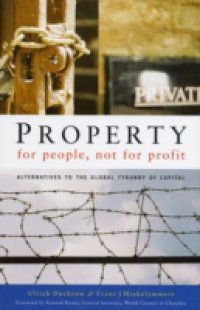| | | Property for People, Not for Profit A introductory fragment is available | Language of a book: Английский Publisher: Gardners Books | |
|
| | The issue of private property and the rights it confers remain almost undiscussed in critiques of globalization and free market economics. Yet property lies at the heart of an economic system geared to profit maximization. The authors describe the historically specific and self-consciously explicit manner in which it emerged. They trace this history from earliest historical times and show how, in the hands of Thomas Hobbes and John Locke in particular, the notion of private property took on its absolutist nature and most extreme form - a form which neoliberal economics is now imposing on humanity worldwide through the pressures of globalization. They argue that avoiding the destruction of people's ways of living and of Nature requires reshaping our notions of private property. They look at practical ways for social and ecumenical movements to press for alternatives. | | | Мой статус книги: | | |
|
{"b":"438009","o":30} |

